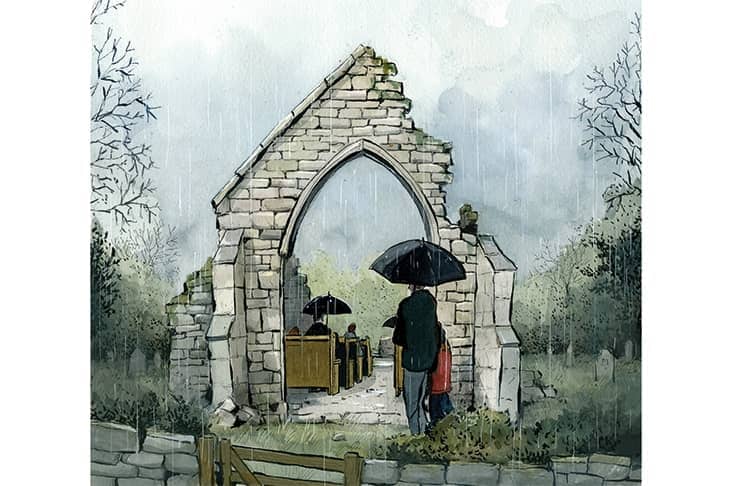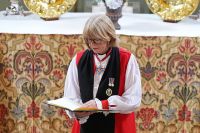The Church of England is in for an explosive summer. In February, Synod decided to allow the blessing of gay couples, and hinted that it will lift the ban on actively gay clergy. Conservative evangelicals have warned the bishops that if they really go ahead with this they will create a split that dwarfs the division over the ordination of women. The bishops have accepted that this is on the cards: a ‘settlement of differentiation’ is likely to be needed, they have said, meaning new structures for the conservatives. Now there’s an awkward wait before the bishops’ next announcement, expected by July.
On one level, what’s new? The evangelicals have been semi-separate for decades. Some of the large evangelical churches have repeatedly refused to pay in to the central funds, in protest at the leadership’s failure to defend traditional sexual teaching. More widely, many evangelical churches will only invite the right sort of bishop to come and do a confirmation service. The split is already a reality, but half-hidden under a veil of strained politeness. Now that veil is being pulled aside. One leading evangelical tells me of a significant development: evangelical ordination candidates have begun to question whether their local bishop has the authority to ordain them. ‘The bishops don’t quite seem to know what’s coming’, he says. ‘It will be a new version of women’s ordination, but squared. For that wasn’t a primary issue for evangelicals. This is.’
It’s a deeply sad moment for the national Church, according to most commentators; a failure of the Church to hold its factions together. But I’m finding it hard to keep my sad face on. As I see it, this is a major opportunity for mainstream Anglicanism to renew itself.
But surely evangelicalism has always been an important part of the Church of England? Yes, but it has become a destabilising force, a liability. And it is less indispensable than it thinks.
Evangelicals are different from other Anglicans. And very proud of it. If they have finally decided that they are too pure and righteous for the national Church, well forgive me for not being entirely depressed.
I first noticed this form of religion when a recent old-boy came back to give a talk at school. To illustrate his message he drew a diagram, with stick-men, about how the Cross saves us from sin and hell. And I remember thinking: that’s odd, that he wants to turn religion, a thing of ancient wisdom and mystery and drama and bottomless dusty beauty, into a sort of chemistry lesson. Later on, as a muddled liberal Christian student, I was half-impressed by their clarity, and their stunning willingness to admit they were virgins. But their presence made it harder for me to come out as a Christian: I didn’t want people thinking I was that sort of Christian. I gradually got over this, but the more I saw of them the stronger the impression grew: this form of religion stood out from the rest of the Church of England, like a sore thumb, or like raised prayer-hands at Evensong – and it revelled in the fact.
Its origins lie in Calvinism, the English version of which was known as Puritanism. A reformed Church must stick to biblical teaching, said the Puritans, which entails certain clear rules about ‘godly’ behaviour. You are not a real Christian by virtue of your baptism: you have to sign up to a rigid version of orthodoxy. This is the only coherent alternative to Roman Catholicism, they insisted, and they had a strong case, such was the uncertainty of the post-Reformation world. But England didn’t want this sort of coherence and clarity. It wanted a less coherent national religion that retained some Catholic elements alongside some Puritan elements, and also incorporated some of the new liberalism that emerged in the seventeenth century. This farrago somehow endured.
Beneath the gloomy headlines of empty pews and bitter rows, mainstream Anglicanism has been quietly solidifying
It wasn’t pretty. There was no golden age of Anglican theology, when the different elements harmonised. To start with, all religious zeal was muffled by gouty Tory squires. Then the Puritan spirit, modified by Wesley, shook things up, and the first Christians to be known as ‘evangelicals’ emerged. The emphasis was now on emotional transformation, being born again, and also on humanitarianism: their zeal helped to end the slave trade. Then the Anglo-Catholic spirit shook things up, and launched a new respect for sacramental worship, and a new affirmation of the urban poor. Both renewal movements were kept in check, and both had to accept the growing political and social liberalism of the Church. The frail alliance was partly kept together by national and imperial confidence.
In the recent decades of decline, the evangelicals have been doing relatively well. They developed networks and youth movements and summer camps and marketing campaigns, making the old-fashioned parish look very crumbly. But their success has been a poisoned silver lining for the Church. For evangelical dynamism cannot renew the Church as a whole. Its energy is too counter-cultural; it presents Christianity as an identity in sharp contrast to the surrounding culture, it insists that a true Christian is marked out by brave dissent from liberal views on sexual morality (see Farron and Forbes). An established Church cannot foreground such energy.
Well, they might rile liberals like me, but shouldn’t one be a bit pragmatic? If they now withdraw their dynamism from the Church, won’t it be weaker than ever? In some ways yes: it will have a yet another funding crisis, and will be mired in legal disputes with semi-departing evangelicals. But amid this new landscape, I suggest, something surprising will be revealed.
Beneath the gloomy headlines of empty pews and bitter rows, mainstream Anglicanism has been quietly solidifying. Anglo-Catholicism and liberalism have become firmly wedded together. The Church now has a solid theological core – something it lacked throughout its centuries of seeming success. The question is whether it can find the boldness to assert itself.
In the mid twentieth century, Anglo-Catholicism still felt alien to most Anglicans, with its enthusiasm for ‘smells and bells’. It seemed at odds with Protestant simplicity, rationality, progress. This changed in the 1960s with the success of the Parish Communion movement, which called for the eucharist to be the central act of worship in every parish. Before that, a parish might only celebrate it a few times a year. Sacramental worship became mainstream, not just the preserve of high church types. Even the evangelicals accepted, in theory, that it was the new normal.
Soon after this, liberal theology underwent a change. It looked like a collapse, but it was actually a healthy pruning. For most of the century, a reformist liberalism, very close to the humanism of the Enlightenment, had seemed cutting-edge. The old doctrines had to be ‘de-mythologised’, adapted to modern thought. The trend was typified by Bishop John Robinson’s book of 1963, Honest to God. In the 1980s, serious theologians began to reject such ideas, and learned to root their thought in the distinctive practices of the Church. But a political and cultural liberalism remained in place, a deep respect for the tradition of the liberal state.
So a moderate Anglo-Catholicism joined forces with a moderate liberalism. It might not sound like the sexiest coupling in the history of ideas, but it means that the Church finally has a solid core. The obvious representatives of this new centre are women priests, for they embody the Church’s social liberalism, and their ministry is more fully encouraged by the Anglo-Catholics than the evangelicals. Also, they have forced Anglo-Catholics to decide if they are liberals or not – and the vast majority have made the right decision.
Some will say that the Church needs the energy of the evangelicals, that their flexibility and instinct for adaptation are more important than ever. I’m not so sure. Unless attempts at innovation are rooted in the fullness of Anglican tradition, they will wither, and cause division. The ‘fresh expressions’ movement proves the point: it became dominated by the standard evangelical idea of mission, and threatened the primacy of the local parish. A spirit of innovation must arise from the Church’s core, its liberal Anglo-Catholic core.
I hope I do not seem hostile to evangelicalism. I simply see it as a different form of Christianity from my own, like Roman Catholicism or Pentecostalism. Good luck to it. But let it no longer claim to be central to the Church of England. Let the Puritans depart in peace.







Comments